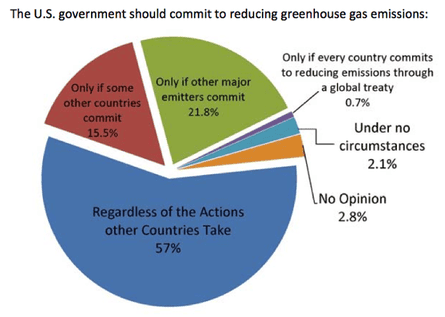The Washington Post’s Matea Gold recently interviewed Charles Koch. When she asked if he was worried about climate change, Koch replied,
Well, I mean I believe it’s been warming some. There’s a big debate on that, because it depends on whether you use satellite measurements, balloon, or you use ground ones that have been adjusted. But there has been warming. The CO2 goes up, the CO2 has probably contributed to that.
This response isn’t entirely accurate. For example, data from satellites, balloons (both of which are also ‘adjusted’), and thermometers on the ground (including their raw, unadjusted data) all show a clear long-term global warming trend at or near the Earth’s surface. But at least Koch acknowledged that the planet has been warming and carbon pollution has contributed to it. In fact, humans are responsible for all of the global warming we’ve seen since 1950.
Despite not being 100% accurate, at least Koch is beyond Stages 1 and 2 of climate denial (denying the problem exists or that we’re the cause). That’s better than some Republican presidential candidates like Ted Cruz and possibly even Jeb Bush, although most other politicians have moved beyond the first stages of climate denial, apparently viewing them as a political liability.
Koch’s Stage 3 and 4 Climate Denial
Unfortunately, Charles Koch exhibited Stage 3 (deny it’s a problem) and Stage 4 (deny we can solve it) climate denial in some of his other interview comments, saying,
They have these models that show [warming], but the models don’t work.
Given the recent study finding that climate models are even more accurate than we thought, and we already knew they’ve been quite accurate, Koch’s “models don’t work” statement was poorly timed and simply untrue. He also claimed,
But they say it’s going to be catastrophic. There is no evidence to that.
Setting impossible expectations is one of the five telltale techniques of climate denial. Do we not have to worry about the consequences of climate change until they become catastrophic? And what if the consequences are just really, really bad? There is certainly plenty of evidence for that; whether or not those potential consequences are deemed “catastrophic” is a judgment call. Is it a “catastrophe” if half of global species go extinct, for example? There’s evidence we’re headed in that direction. I discussed some potential climate impacts in the following Denial101x lecture.
How to Avoid Economic Catastrophe
Koch eventually got to the root of his concerns,
So do we want to create a catastrophe today in the economy because of some speculation based on models that don’t work?
It’s interesting that Koch believes that there’s no evidence for catastrophic climate change, but that cutting carbon pollution will create an economic catastrophe. In fact, that’s exactly backwards.
Cutting carbon pollution has costs, but it also creates benefits by reducing the costs of climate damages. To accurately evaluate the economic impact of climate policies, a cost-benefit analysis is needed. There’s approximately 95% agreement among economists that the benefits outweigh the costs and the USA should take steps to cut its carbon pollution.

Consider the energy sector. We only know the true costs of various energy sources if we also account for the cost of the climate damages they cause, because taxpayers have to pay those costs as well. If you combine the costs of renewable vs. fossil fuel energy, and the estimated costs of climate damages, then wind and solar energy are in reality far cheaper than coal. Wind is also much cheaper than natural gas, and solar panels are around the same cost as natural gas.
Moreover, there are ways to curb those climate damage costs without hurting the economy. One study, for example, found that a revenue-neutral carbon tax (in which 100% of the revenue generated from the tax is rebated to taxpayers) would be modestly beneficial for the economy without even accounting for the economic benefits of reducing climate damages. Such a policy would have to be implemented by US Congress. Unfortunately the Republican Party currently opposes all efforts to cut carbon pollution.
This has forced President Obama to address the problem. Specifically, his Environmental Protection Agency has followed its legal obligation to regulate carbon pollution. Charles Koch and most of the Republican presidential candidates have expressed opposition to this approach, claiming that it will harm the economy.
This is the standard industry reaction whenever pollutant regulations are proposed. As President Obama noted, in every case the regulations have been successfully implemented, benefits have exceeded costs, and the economy and regulated industry have done just fine.
Bad for Koch Business, but Good for the Rest of Us
However, if conservatives are worried about these government regulations, there’s an easy solution: pass climate legislation that replaces those regulations with a free market alternative. That’s what Democrats have been trying to do for a decade. They even came close in 2009, and would have been successful with just a little bit of Republican support.
The problem for the Kochs is that even free market, small government policies to cut carbon emissions will be bad for the fossil fuel industry from which they greatly profit. And with the Kochs’ political network pledging $889 million for the 2016 election campaign, the Republican presidential candidates are under serious financial pressure to toe the same line.
But in the real world, an economic catastrophe is far more likely if we fail to cut carbon pollution than if we succeed. We can use free market forces to cheaply reduce those emissions, and in the process produce a great economic benefit by minimizing the costs of climate damages. It would be a loss for the fossil fuel industry, but a big win for the rest of the world.

Comments (…)
Sign in or create your Guardian account to join the discussion